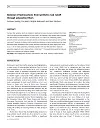Compact filter systems, which are installed to significantly reduce the load of pollutants from road runoff, are very promising treatments for urban runoff. The objective of this research was to evaluate the effectiveness of activated carbon, activated lignite, zero valent iron, exfoliated graphite, amorphous ferric hydroxide, and activated alumina at removing petrol hydrocarbons from synthetic road runoff. Therefore, the kinetics and the equilibrium adsorption of petrol hydrocarbons onto these adsorbents were investigated using column adsorption experiments at levels ranging from 100 to 42 g L−1. Of the tested adsorbents, exfoliated graphite is the most effective with a maximum adsorption capacity for petrol hydrocarbons of 3,850 mg g−1. The experimental equilibrium data are fitted to the Freundlich and Langmuir models.
